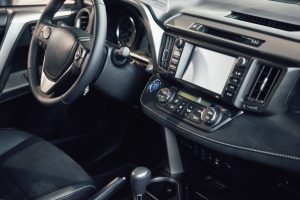Embarking on the journey of buying a new car brings excitement and questions, especially regarding the technology it packs. One key query many ask is, “Does my car have GPS tracking built in?”
The good news is that the majority of modern cars, ranging from sleek luxury rides like BMW and Mercedes-Benz to reliable mainstream choices like Chevrolet and Ford, now come equipped with integrated GPS tracking systems.
In this blog post, we’ll unravel the mystery behind what cars have GPS tracking built-in. This nifty feature not only aids in navigation but also plays a pivotal role in enhancing the security of your vehicle.
Whether you’re a concerned parent ensuring your teen’s safety on the road or an inquisitive car buyer, join us on this journey to discover the fascinating world of GPS tracking in automobiles.
What Exactly Is GPS Tracking?
GPS, or Global Positioning System, is like a high-tech map that reveals your exact location globally. It uses satellites and ground-based gear to track longitude, latitude, direction, and speed. A GPS tracker, a small device, emits signals letting you monitor your vehicle’s location via phone or computer.
The Mechanism Behind GPS Tracking Devices
GPS tracking relies on 24 satellites circling Earth. Your car or phone’s GPS receiver catches signals from these satellites, performing a cool trick called trilateration.
This measures signal travel time from at least three satellites to pinpoint your location. GPS trackers in cars use this too, linking to satellites through the Global Navigation Satellite System.
Powered by your vehicle’s battery, they transmit data to software, ensuring your ride stays trackable, even if it has a hidden internal battery. This way, your GPS tracker is like a trusty travel companion, always in sync with your car’s movements.
Want to explore advanced tracking options? Check out our guide on the ‘best places to hide Airtag in your car‘ for an added layer of security.
What Cars Have GPS Tracking Built-In
Vehicle theft is on the rise in the U.S., with nearly 500,000 reported cases in the first half of 2023. Wondering if your car has GPS tracking?
Research suggests that 98% of U.S. cars will have GPS within five years. Currently, 78 million vehicles in the U.S. have built-in GPS. While GPS is prevalent, it’s not a legal requirement.
GPS navigation for personal vehicles started in 2001, so older vehicles might lack built-in GPS. Brands like Nissan, Hyundai, and Ford offer factory-installed GPS.
Not all cars have GPS tracking, but advancements mean most modern vehicles have GPS for navigation, replacing the need for a phone. However, exclusive tracking features may vary among vehicles.
- General Motors (GM) OnStar: Chevrolet, Buick, GMC, and Cadillac models equipped with OnStar offer GPS tracking for stolen vehicle recovery and emergency assistance.
- Hyundai Blue Link: Some Hyundai models include Blue Link, featuring stolen vehicle recovery and emergency assistance as standard equipment.
- Toyota Safety Connect: Standard in some Toyota models, offering stolen vehicle tracking and emergency assistance.
- Volvo On Call: Volvo provides On Call service in some vehicles, offering GPS tracking for theft or emergencies.
- Tesla: Tesla vehicles have built-in GPS tracking for diagnostics, updates, and theft prevention, with subscription-based access.
- Genesis: Genesis Connected Services Emergency Rescue Center supports fast-tracking of stolen vehicles with real-time location and route information.
- MINI Connected: MINI’s Remote Services allow status checks, tracking, and window/door status checks via the MINI App.
- Porsche Car Connect (PCC) and Porsche Vehicle Tracking System (PVTS): Standard in all new 911 models, providing tracking features.
- FordPass: Ford’s app allows remote operations, locating, and inspection of the car, with features like vehicle locator and journey recording.
- HondaLink: Honda’s app offers GPS tracking in the Remote category, including features like locating parked cars and a stolen vehicle locator.
- Lexus Enform Remote: The Lexus app provides GPS tracking, directions, and alerts for customizable limits for miles, speed, and duration.
- MyNissan App: Compatible with select models, offers GPS features like My Car Finder, navigation, and remote locking/unlocking.
- My BMW App: BMW’s app allows locating parked cars, providing a remote 3D view, real-time traffic updates, and navigation features.
Why GPS Tracking Devices Are Game-Changers?
GPS tracking devices in cars offer numerous benefits:
- Family Sharing: Multiple-driver access to the app ensures shared visibility into the vehicle’s status.
- Smart Alerts: Receive instant alerts for various activities such as engine on/off, speeding, and late-night driving.
- Improved Safety: Real-time tracking enhances safety, and some systems include SOS buttons for emergencies.
- Reduced Road Time: Real-time monitoring reduces engine idling, finds better routes, and minimizes delays.
- Cost Saving: Efficient fuel management, reduced reckless driving, and improved time management contribute to significant cost savings.
- Child Safety: Monitor your child’s location for enhanced safety, especially considering motor vehicle accidents as a leading cause of teen deaths.
- Emergency Assistance: In emergencies, GPS tracking aids faster location by emergency services, facilitating quicker assistance.
- Quick Vehicle Recovery: In case of theft, GPS tracking helps recover the vehicle faster, addressing the prevalent issue of car thefts.
These benefits underscore the practicality and importance of incorporating GPS-tracking technology in vehicles.
Key Considerations for Cars with Integrated GPS Tracking
Choosing a car with built-in GPS tracking involves considering key features:
- Real-Time Tracking: Ensure real-time and accurate information, vital for effective tracking and notifications. Actual real-time data matters for effective tracking, especially in theft scenarios.
- Geo-fencing: Mark virtual boundaries for alerts upon entering or leaving specific areas, providing additional security.
- Speed Alerts: Get notified if your child exceeds set speed limits, enhancing safety.
- Smartphone Integration: Ensure the GPS easily integrates with your smartphone for convenient monitoring.
- Alerts and Updates: Receive customizable alerts on various issues, such as vehicle stop/start, speed, and maintenance reminders.
- Driver Behavior Monitoring: Improve driving behavior for enhanced efficiency and productivity, using insights on speeding, braking, and more.
Choosing a car with these features ensures effective monitoring, enhanced safety, and streamlined operations.
Can A GPS Tracker Be Added To A New Car?
Absolutely! Adding a GPS tracker to a new car is possible through factory, dealer, or device kit installations. Factory installations are not manual, requiring a technician.
If your teen’s car lacks built-in GPS, no worries. You can discuss adding one with the dealer or have your mechanic install a tracking device. For recommendations, check out Car and Driver’s ” Best Car GPS Trackers.” It’s a helpful site for car reviews and news.
What Is The Best Place To Hide GPS In Your Car?
For discreetly hiding a GPS in your teen’s car:
- In the Bumper: Both front and rear bumpers serve as great spots. You can remove the bumper for installation or securely attach the GPS with velcro, seamlessly blending in.
- Inside the Dashboard: Opt for installation below the steering inside the dashboard. Though challenging to reach during installation, it stays out of sight, deterring potential removal by robbers or curious teens.
- Under the Seat: Conceal beneath the car seat for added stealth, ensuring proper reinstallation afterward.
- Under the Car: Consider magnetic GPS trackers with waterproof features for secure attachment under the car, protected against water and dirt.
- Front or Rear Bumper: Surprisingly effective, nestled within the wires, temperature, and light cobweb, requiring assistance from a car mechanic.
- Under Carpets: Hide the tracker below and between the seats, providing an inconspicuous yet effective option.
Get creative with innovative spots like the wheel well or beside the cylinder or toolbox for added secrecy.
How To Find Hidden GPS Device On Your Car?
GPS trackers are usually discreetly placed in cars, often in the wheel well or under the vehicle. Here’s how to find them:
- Physical Inspection: Thoroughly check your car’s interior and exterior, including the undercarriage, dashboard, inside bumpers, and under the hood. Criminals tend to hide GPS devices where you can hide them.
- Use a GPS Detector: Opt for a GPS scanner, an efficient tool to find hidden devices without a physical inspection. It provides quick results, even if an initial check missed the device.
- Diagnostic Port: Check the diagnostic port inside your car, located near the steering wheel. Unplug any suspicious devices without causing damage.
- Underneath Your Vehicle: Examine the underside for unusual boxes with or without antennas, magnetically attached or taped. Fuel tanks are common hiding spots.
- Wheel Wells and Bumpers: Inspect inside wheel wells and beneath bumpers. Devices may be attached with adhesives or magnets. Be cautious if wired, consulting your manual or a mechanic.
- Roof: In tall vehicles or those with sunroofs, check for devices in plain sight or inside the sunroof retraction slot.
- Seats, Floor Mats, and Carpet: Look for hidden trackers under seats, floor mats, or within the interior carpet, especially if someone has access to your car.
- Under the Dashboard: Examine for suspicious wires. If unsure, consult your mechanic to inspect under the dashboard, glove box, seats, and floor mats.
- Hatchback and Trunk: While GPS trackers usually don’t go in trunks, check the rear part of a hatchback for hidden devices.
- Under the Hood: Explore common hiding places under the hood, such as behind the radiator, between batteries, in air ducts, or in the air filter.
- Plugged into Car’s Data Collector: Modern cars have data collectors; if there’s an unknown device plugged in, investigate immediately. Stay vigilant, ensuring your car remains free from unauthorized tracking.
How your vehicles are being tracked
Let’s break down how your vehicle is being tracked, and why it matters.
1. Event Data Recorders (EDRs): Think of them as “black box trackers.” If your car is post-1995, it likely has one. EDRs record crash-related data for about 20 seconds, purging the rest.
2. OEM Technology: Big car makers like Ford and Honda install tracking tech in 98% of new vehicles. Buried in the paperwork, you may find it’s there, subtly disclosed.
3. Your New Car is Watching: Currently, a whopping 78 million cars are equipped with tracking technology, and experts predict that soon, a staggering 98% of all new cars will come with this feature. So, when you sign the papers for your shiny new ride, you’re not just getting the keys – you’re also getting a vehicle that’s in the know about your every move.
4. Entertainment System Invasion: Connecting your smartphone via Bluetooth or USB gives your car access to a trove of data. Your phone book, call logs, texts, and pictures—all fair game.
5. Smartphone Apps: Both Android and Apple track your location; numerous apps join the surveillance party.
Those permission pop-ups? They’re asking because your phone is already on the case.
6. Telematics Devices: Insurance companies offer devices to track your driving habits. Good news: You opt in, and they must disclose what they’re monitoring.
If you suspect someone is tracking your vehicle without permission, take these steps:
- Gather Proof: To address this serious offense, gather evidence. Discovering a tracker in your vehicle or capturing someone applying it serves as strong proof.
- Check Rented/Leased Vehicles: If renting or leasing, ensure the provider explicitly mentions vehicle tracking in conversations or paperwork. Without proper disclosure, file a formal complaint.
- Understand Your Rights: While tracking in rental/leased vehicles may have legitimate reasons, undisclosed tracking violates privacy and data protection rights.
- Use Detection Devices: Employ available devices to detect trackers on your car. Manual methods can include a thorough physical inspection or specialized tools designed for this purpose.
FAQs
1. Do GPS tracking devices need the internet?
No, GPS tracking devices operate via satellite signals and do not require an internet connection. They communicate directly with the owner’s tracker to determine the vehicle’s position.
2. How much does a GPS tracking device cost?
GPS tracking device costs vary, ranging from $20 to $250 or more, depending on device type and desired features.
3. Is it mandatory for new cars to include a GPS tracking system?
No, GPS trackers are not mandatory by law for new cars. Owners can deactivate or remove them, though it’s not recommended, as GPS serves as a valuable safety measure, especially in regions prone to car theft.
4. What are the functions of GPS tracking devices?
GPS tracking devices offer several functions, including reducing fuel costs, ensuring safe driving practices, mapping efficient routes, and providing theft alerts.
5. Do cars have built-in GPS tracking?
Many new cars have built-in GPS tracking, with approximately 78 million cars in the U.S. currently equipped. Removal is possible, but it’s becoming a standard feature, enhancing vehicle safety.
6. Can I put a GPS tracker on my car?
Yes, you can legally install a GPS tracker on your car. However, it’s illegal in the U.S. to install one on another person’s car without explicit consent.




